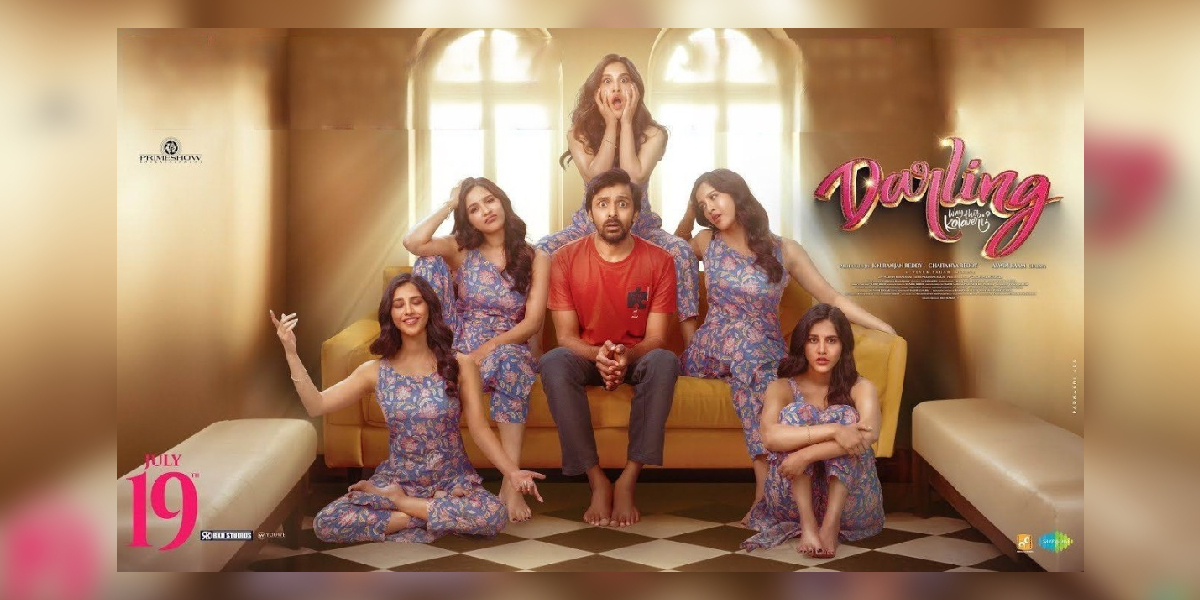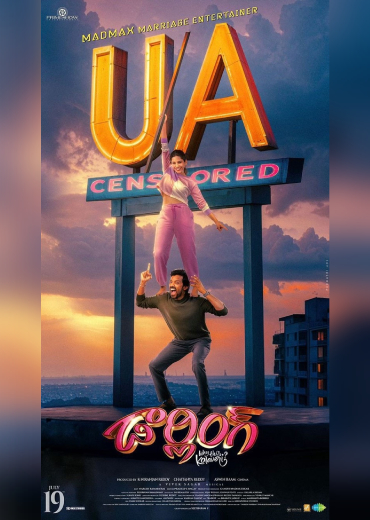The film succumbs to the "male saviour" syndrome and is the latest addition to a growing list of films that make a mockery out of a character's condition.

A poster of Aswin Raam's directorial 'Darling'. (X)

Darling represents everything that’s wrong with Telugu cinema. It believes marriage is the ultimate goal in life.
A young Raghav, faring poorly at school, is fed with the idea that academic success is the only way to help him fetch a wife as good as his mom. When a teacher asks the boy about his ambition, he talks of marrying his ladylove and going on a honeymoon to Paris.
Many years later, Raghav ironically works at a travel agency and plans to apply for a passport only after marriage—to make a trip to Paris with his future wife.
When Raghav’s marriage plans fail to take off, he bumps into Anandi, who changes his worldview drastically. Sparks fly and there’s a hush-hush wedding. However, Anandi harbours a secret that could alter the course of the relationship.
The dramedy borrows its premise from Aparichutudu (2005) and other similar films where the protagonist tolerates a partner with a peculiar condition—from Bhale Bhale Magadivoy (2015) to Mahanubhavudu (2017).
While in most films, it’s the woman who tolerates the man’s problems, Darling is about a man who stands up for his emotionally vulnerable partner, come what may.
Regarding treatment, Darling is heavily inspired by Anil Ravipudi’s F2 (2019), where a regressive first half celebrating male chauvinism paves the way for a finale that tilts the balance in favour of the woman.
However, unlike the latter, Aswin Raam is no expert at comedy and struggles to handle the change of tonality in the treatment after the intermission. The result is one gigantic, over-long mess.
Darling is superficial at every level, giving little time to establish the characters and their interpersonal relationships. Raghav and Anandi hastily marry within five hours of their first meeting. It’s hard to believe how Raghav goes from being a disgruntled husband to a caring partner who’d sacrifice everything.
Even comedy relies on the same idea to generate a few silly laughs.
While there’s no harm in taking the slapstick route to explore Anandi’s condition—multiple personality disorder, both treatment and performances remain surprisingly insensitive and distant.
A terrible sequence where Raghav makes an abuser fall under Anandi’s feet (to provide closure to her trauma) and portrays the former as a hero says a thing or two about the director’s ‘sensibility’.
If this wasn’t enough, a fake godman (read “butthurt” husband) empathises with Raghav’s plight and rants about how a wife is a curse in one’s life.
An astrologer cautions Raghav’s parents about their son’s ‘inactive’ sex life. The girl’s character is intentionally ridiculed for her silly, exaggerated behaviour (due to the farcical premise) and the film gets worse by the hour.
Anandi goes on a slapping spree while shopping for her reception but Raghav’s aunt forgives her—all for an expensive saree. Much like F2, director Aswin Raam reinforces gender stereotypes by portraying women as shopaholics.
Just when you think the director is done with his farce, a ridiculous twist (which should’ve been positioned at the interval) delays the inevitable by a good half an hour.
Darling could’ve left you with a better aftertaste if the director at least made a sincere effort to explore Anandi’s backstory.
Badly written scripts downplay the potential of capable actors and it couldn’t have been truer in Priyadarshi’s case. Just like his character who tries to be a saviour husband, the actor unsuccessfully tries too hard to salvage the film’s fate.
However, the biggest casting catastrophe for Darling is Nabha Natesh. Though it’s completely agreeable how the character may not have had meat to extract a convincing performance from her, it’s more disappointing that her cold, detached, and caricaturish performance robs the film of its soul.
Telugu cinema has yet to give her anything worthwhile after her decent debut—Nannu Dochukunduvate (2018).
Muralidhar Goud is getting increasingly repetitive with his loudmouth roles (in Telangana slang), while Brahmanandam is wasted in the role of an unfunny boss.
The likes of Krishna Teja, Kalyani Raju, Venu Yeldandi, Moin, Sanjay Swaroop and Jeevan Kumar don’t quite get to make a mark either.
Ananya Nagalla is the rare actor in the film who appears comfortable in her shoes and makes the most of a crucial role. Niharika Konidela has a solid screen presence though the cameo makes no significant impact in the film.
Vivek Sagar’s songs are misplaced in outrageous situations. “Raahi Re” is the only number that instantly strikes a chord. The film’s flashy colour palette gets distracting and indulgent at times.
Darling succumbs to the “male saviour” syndrome and is the latest addition to a growing list of films that make a mockery out of a character’s condition. At over 160 minutes, it outlasts its welcome (by an hour, at least).
It’s natural to expect something promising from Priyadarshi after Mallesham (2019), Balagam (2023), and Om Bheem Bush (2024), but Darling misses the bus by a wide margin.
(Views expressed here are personal.)
(Edited by Y Krishna Jyothi)


Feb 17, 2026

Jan 27, 2026

Jan 17, 2026

Jan 09, 2026

Jan 08, 2026

